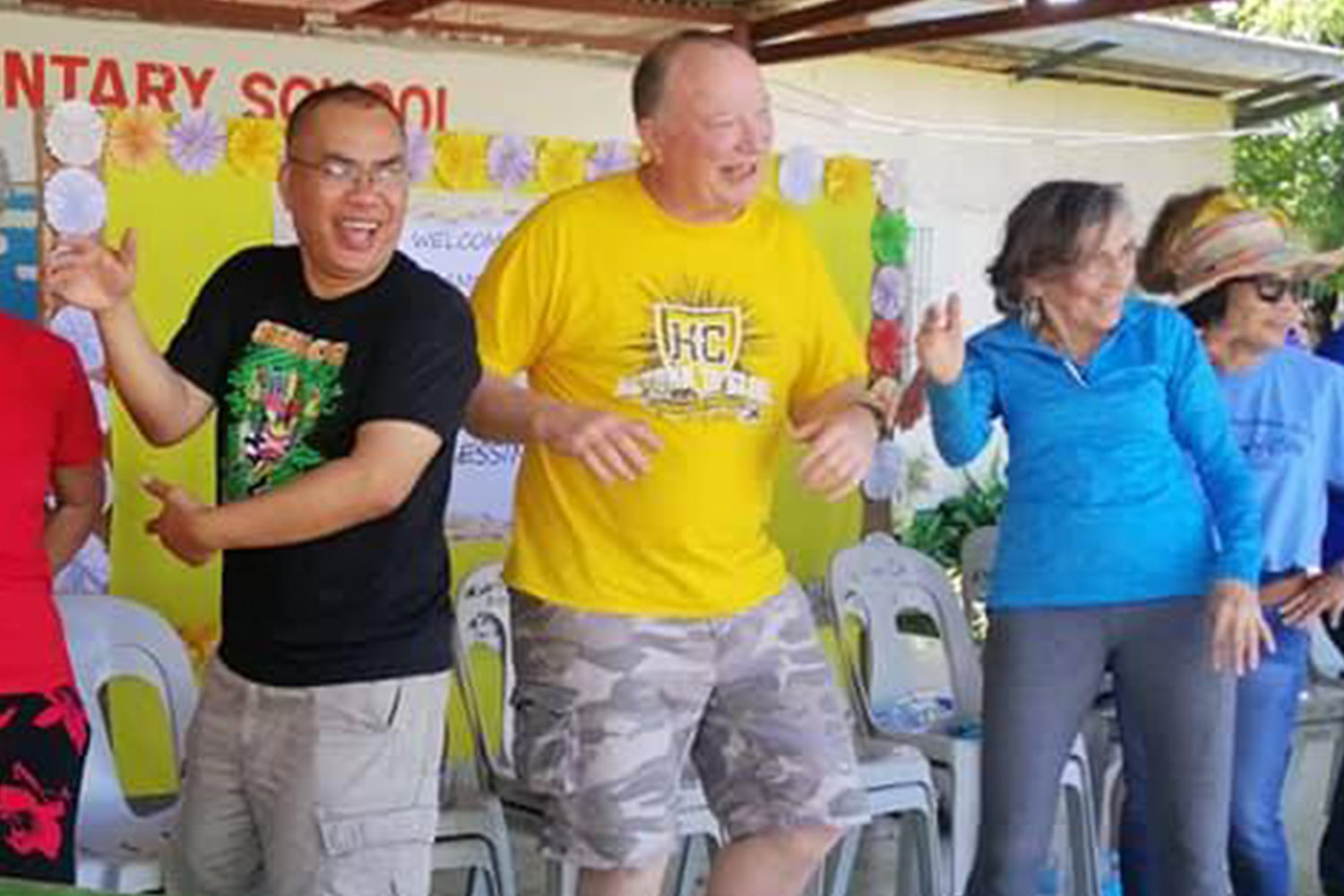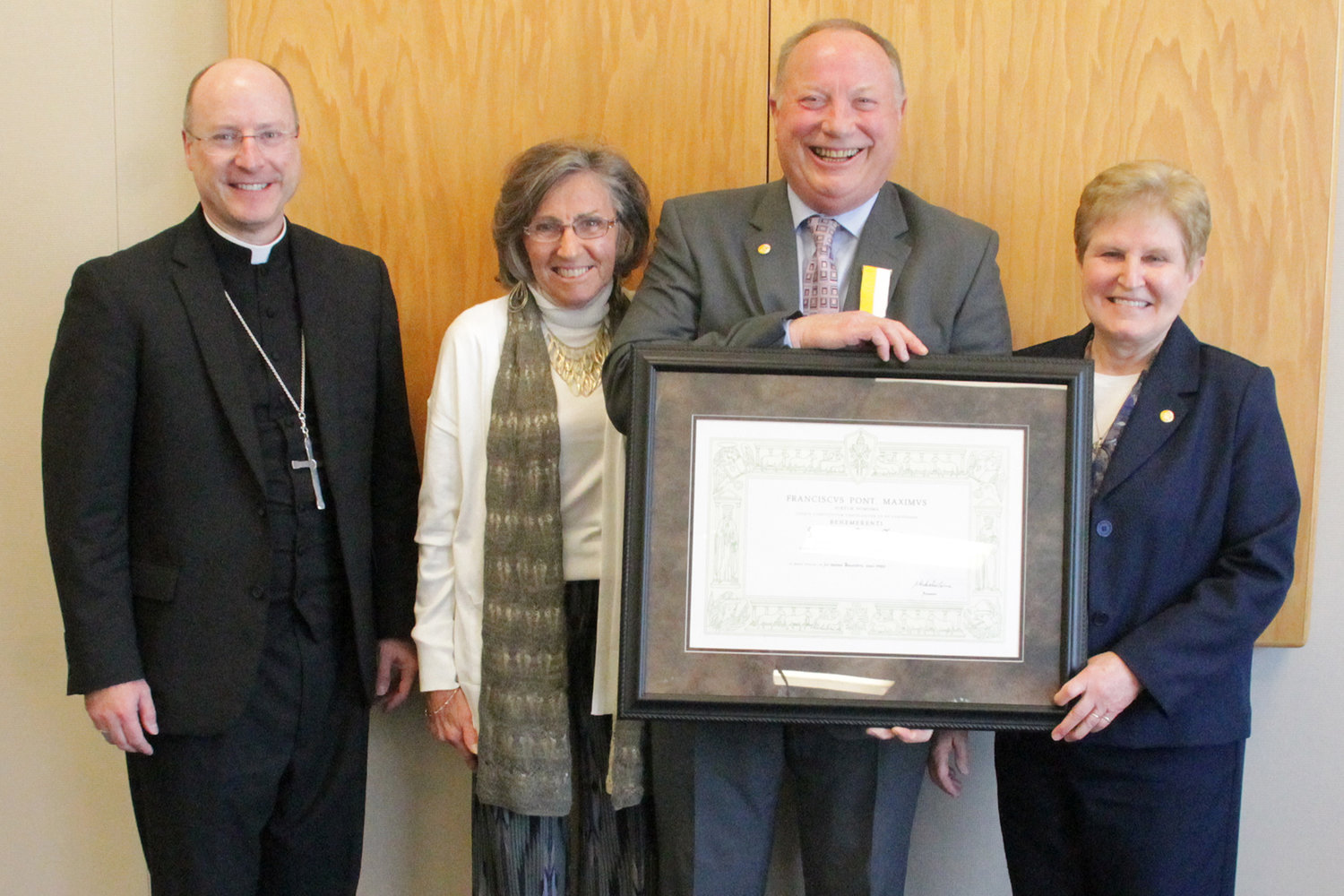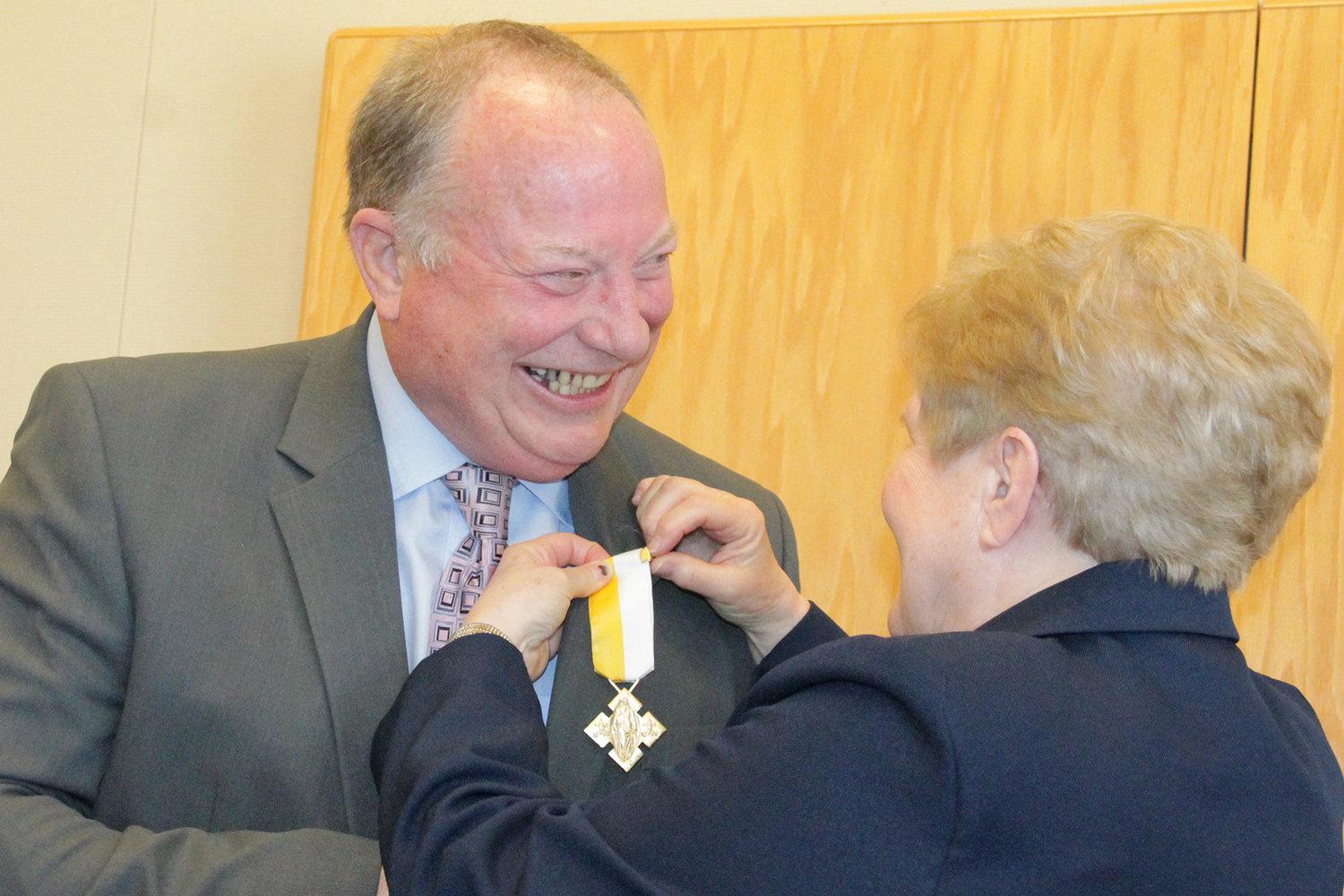Mark Saucier’s 43-year career has been a missionary pilgrimage
Retired since February, he continues writing reflections for The Catholic Missourian

SCROLL THE ARROWS to see two more photos.
A friend of Mark Saucier’s is fond of pointing out that the Church doesn’t have a mission.
The Church IS the mission.
“It’s the mission of Jesus Christ — being His presence in the world,” said Mr. Saucier, longtime mission director for the Jefferson City diocese and columnist for The Catholic Missourian.
“And because of that, we are not only concerned with our local community,” he insisted. “Our concern has to extend to the edges of the world, so there is no place where we wouldn’t be.”
Mr. Saucier retired this spring after serving for 43-and-a-half years in various roles for the Jefferson City diocese.
He continues to write his column from home.
“Working for 43 years for one employer, especially these days, may show a real lack of initiative,” he stated. “But I was blessed to have a lot of different responsibilities. That kept it very interesting.”
Bishop Michael F. McAuliffe, now deceased, hired him in 1976 to work half-time in the diocesan Religious Education Office and half-time in the Communications Office.
He served as communications director for over 30 years, worked with missions for 30 and began penning his column during Lent of 2000.
“I’ve done radio and video production,” he said. “I was the coordinator for a huge diocesan renewal program, known as ‘Our Journey in Faith,’ back in the 1980s.”
The diversity of activity helped him acquire an array of skills.
“And it exposed me to a lot of phenomenal people I would not have met if I were working in only one position,” he said. “I have learned a tremendous amount from them.”
Never looked back
Mr. Saucier’s passion for mission dates back to his growing-up in Taos in the 1960s.
His parents were very active in St. Francis Xavier parish and sent their eight children to the parish school.
Mr. Saucier met Father (later Monsignor) Raphael Keyes, now deceased, after he arrived from Ireland to serve as a priest of this diocese.
Their friendship continued through Msgr. Keyes’s 35 years in the diocese’s missions in the Peruvian Altiplano.
“Knowing him helped pull me toward the missions in Peru initially and then toward mission in general,” said Mr. Saucier.
Twelve hours after graduating from Helias Catholic High School in Jefferson City, he and a classmate boarded a plane to Peru, to spend a summer working with the Jefferson City mission team in Capachica.
“I lived with four priests, two sisters and four lay volunteers,” Mr. Saucier recalled. “We ate, worked and prayed together. We spent our days building, teaching, healing and ministering.”
At night, they’d sit together in the sala, reading and writing, sharing stories and sometimes arguing.
“We could disagree about many things,” he recalled, “but when it came to serving the poor, we were of one heart, set afire by the Gospel.”
“That experience sealed the deal for me,” he said. “I never looked back.”
He earned bachelor’s and master’s degrees in religious education from the University of Notre Dame.
That’s where he met his wife, Carolyn, who would go on to work for the diocese’s Religious Education Office for over 20 years.
“Touched, redeemed, saved”
Shortly after joining the bishop’s ministry team, Mr. Saucier helped develop the diocesan-wide leadership development program known as “Directions 80s.”
He followed that up by leading the team that wrote and produced the diocese’s four-year, parish-based spiritual renewal program known as “Our Journey in Faith.”
“I was working with some really creative people, and we got a lot of feedback from the parishes,” he said. “We tried to incorporate those suggestions and criticisms as we wrote the next sections. I think that was a big factor in how successful it was.”
He began splitting his time between communications and the Mission Office in 1990.
“When I first came over to missions, it was already a very strong and viable operation under the direction of Father John Groner and Alice Wolters,” he recalled. “They and Lorna Tran and Alice Loethen were incredibly dedicated and enriched my life in so many ways.”
Bishop Joseph M. Marling C.PP.S., now deceased, founding bishop of Jefferson City, had answered Pope St. John XXIII’s call for missionary work in the Southern Hemisphere by creating a mission partnership with the bishops of Marcona and Nasca, Peru.
Over the next 40 years, up to 10 percent of the active priests of this diocese were serving in parishes in Peru.
This diocese’s per-capita giving to these missionary endeavors ranked for decades among the highest in the nation.
Bishop John R. Gaydos, now retired, arrived in 1997. Throughout his 20-year episcopacy, the diocese’s missions branched out into partnerships with Catholic organizations in Mexico, the Philippines, India and the slums of Lima, Peru.
“Countless lives have been touched, redeemed and saved,” said Mr. Saucier. “We have brought food, water, housing and electricity to the poor who could only dream of it. We have provided health, education and liberation to entire communities. We have built roads, churches and schools.”
Several parishes also formed relationships with dioceses overseas or undertook humanitarian projects as priests from several countries came to minister here.
All the while, a deeper understanding of mission — one more rooted in encounter and mutual giving — continued to unfold in the diocese and throughout the Church.
“The first thing we need to know about mission is that it’s all about a relationship,” said Mr. Saucier. “It’s about giving and receiving. It’s about listening and sharing and gaining insight from each other’s experiences — how they think, how they feel, how they pray, how they celebrate.”
When he first visited Peru, the most reliable way to communicate with people back in Missouri was over shortwave radio.
Technology has made it easier to stay in touch with people who are thousands of miles away and develop sustained relationships with them.
“And from that, we gain a broader, more complete image of the Body of Christ,” he said.
Words and images
When Mr. Saucier began his tenure as communications director, most of his energy went into producing radio and video programs and helping the bishop, pastors and the various Chancery offices with their communications needs.
He produced “Where Land Is Life,” a documentary video about land reform in Peru, focusing on this diocese’s mission parish in Capachica, which aired on the national Catholic television network.
Another documentary, “Caught in the Loop,” examining the Missouri correctional system’s failed efforts to address the problem of drug addiction in the state’s prisons, was broadcast on the PBS stations in Missouri.
He hosted a weekly radio program that was heard every Sunday in central Missouri.
As diocesan spokesman, he brought steadiness and candor to the diocese’s response to the 2002 revelations of sexual abuse of minors that had been committed by members of the clergy.
On the eve of the Church’s worldwide Jubilee celebration in 2000, a pastor in northern Missouri asked him to write a series of short spiritual reflections to be published in a local newspaper.
The editor of The Catholic Missourian asked for permission to republish those articles, and Mr. Saucier continued writing them.
They quickly became a popular feature in the paper.
He has written more than 800 of them, none more than 400 words in length.
“Doing the columns has changed me,” he stated. “It has made me much more introspective. It’s made me pay closer attention to the significance of people and events in my life.
“Then, when you sit down to write about it, you have to take it as deep as it will let you and try to express it in ways everyone can relate to,” he said.
The columns that generate the strongest feedback focus on such experiences as the birth of a grandchild, the sickness of a parent or the death of a friend.
“Most people, as least those of a certain age, can relate to those kinds of experiences,” he said. “So it’s not about me, it’s about people seeing these kinds of things in their own lives.”
He wants to keep writing as long as the columns are of some benefit to the readers.
“But I want to know if it gets dry or stale or mediocre, because that’s when it’s time to quit,” he said.
“Good merit”
Mr. Saucier helped plan and execute the diocese’s Catholic Stewardship Appeal for four years.
He continued working through aggressive treatment for cancer, reaching remission about a year ago.
Bishop W. Shawn McKnight, upon arriving in early 2018, asked him to stay on for a while, at least through the bishop’s transition.
Mr. Saucier did so until shortly after his 70th birthday.
“We are so grateful for his ministry, keeping the needs of the Church throughout the world before our minds,” Bishop McKnight said at Mr. Saucier’s retirement reception.
On behalf of Pope Francis, Bishop McKnight presented Mr. Saucier a Benemerenti Medal.
The papal honor, instituted by Pope Gregory XVI in 1832, is conferred to people “who have shown an active fidelity to and love for the Church,” for distinguished service to Catholic principles, the Church and society.
“Benemerenti” is Latin for “good merit.”
Mr. Saucier thanked Bishop McKnight and Bishop Emeritus Gaydos for their support and enthusiasm for the missions.
“I think it’s a great time to be moving on and passing the torch,” he stated. “One thing I really appreciate is seeing all the young faces here — people who are the same age or a bit older than I was when I started here. I think that bodes well for our Church.”
On pilgrimage
Mr. Saucier said that through the years, he has encountered many paths to similar destinations.
“I have found different ways of prayer, different ways of thinking, different ways of being that change over the course of time as new challenges present themselves,” he said.
He insisted that compassion and change are nonnegotiable.
“It’s taken me a long time to learn this,” he said, “to have it go from intellectual concepts and words to practice, to that creed of the heart.”
He had anticipated spending more time with his family and assisting with some of his local passions, including Healing House and New Beginnings, serving people coming out of the judicial system with an addiction history, and the Merida Foundation, providing food and eye glasses in Mexico’s Yucatan Peninsula.
But the first three months of his retirement coincided with the COVID-19 pandemic, leaving him to ramp-up his already prodigious reading regimen.
He feels like “a pilgrim on a quest.”
“It’s the pilgrimage itself that’s become important to me, and it’s become the definition of my life,” he said. “I’m learning more about myself, about my work, about my God every day.
“And it’s not just learning, it’s living and giving, as well.”
Comments
Other items that may interest you
Services
The Catholic
Missourian
2207 W. Main St.
Jefferson City MO 65109-0914
(573) 635-9127
editor@diojeffcity.org








